Inclusions Not An Illusion: Q’s Corner
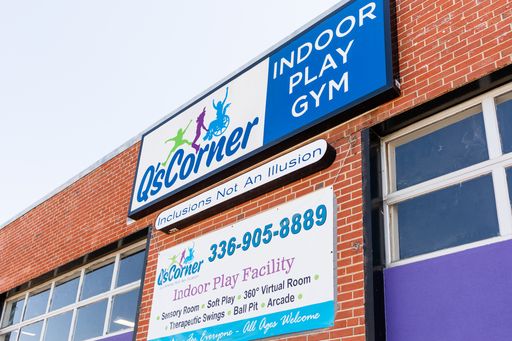
When Candace Humphrey graduated from Winston-Salem State University with a bachelor’s degree in rehabilitation studies, she knew she wanted to support and advocate for individuals with disabilities, but she had no idea that one of those individuals would be her own son.
“Quintin just had his tenth birthday, but we got his diagnosis when he was about three and a half years old,” Candace says. The diagnosis, autism, was placed on Candace’s then non-verbal son. Candance was told her son would most likely never be able to talk or communicate. But Candace and her husband, former NFL player, William Hayes, never believed in accepting the “can’t do’s” about their first-born son.
“You can never count an individual out because of what people say that they won’t do,” Candace says. “They’ll surprise you and be doing everything you thought that they wouldn’t.”
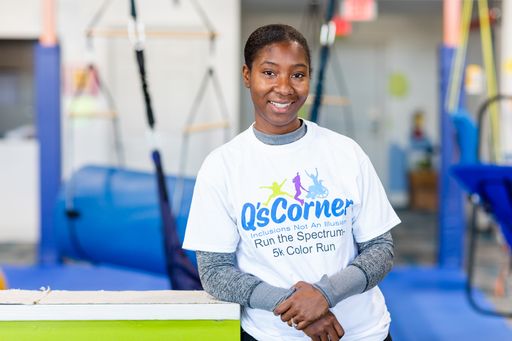
With years of behavioral therapies, routines, structure, and a lot of work on his parents’ part, Quintin is now reading and interacting with his family and peers.
But throughout coping with Quintin’s diagnosis, along with caring for their three other children, Candace began to notice all the ways that our culture doesn’t accommodate individuals with disabilities. Restaurants, playgrounds and play facilities, stores, and more were places of constant stress for Candace, just like they are for many parents of children with disabilities.
“We would go into certain places, and Quintin might start screaming or yelling,” Candace explains. “A lot of people didn’t understand that he has autism. It’s not a physical disability, so you don’t see anything physically wrong with him. People would assume that he was just a bad kid.”
She noted that at trampoline parks or play facilities, children with autism often become tired or over-stimulated and need to lie down. Play gym staff, trained to look for safety risks, may yell at or lecture a child who is responding to sensory overdrive, leaving parents tense and frustrated.
A then stay-at-home mom, Candace would take her son to and from various therapy sessions, and she started noticing the kind of equipment and play therapies he experienced there.
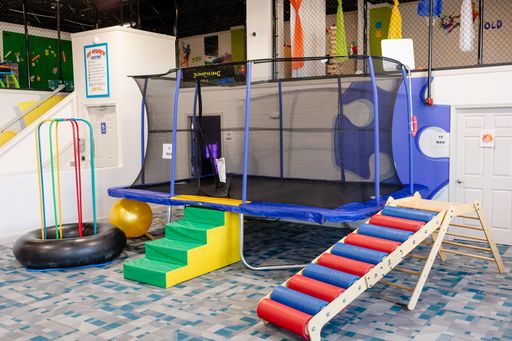
“Quintin would have most of his fun when he was at a therapy session because they had access to the equipment that he needed,” Candace says, adding it’s not feasible for many families to purchase therapeutic play equipment at home. The cost is over-inflated, due to the special tag of “therapeutic.” This leaves children with disabilities to enjoy playtime for sometimes as little as one hour a week in therapy.
“That’s not fair that he can only have fun when he’s in therapy,” Candace recalls thinking. “I should be able to take him anywhere.”
And that’s when the vision of Q’s Corner was born.
“I wanted to create a space where all individuals can come and engage in fun and not have to be worried about being judged,” she says. “Most importantly… we give parents reassurance that it’s okay that your child is different. Some parents are embarrassed to take their kids to certain places because they feel like if their kid has a meltdown, people are going to look or stare or be judgmental.”
But at Q’s Corner, Candace envisioned parents being able to see their kids experience fun for the first time in an environment with no boundaries or obstacles.
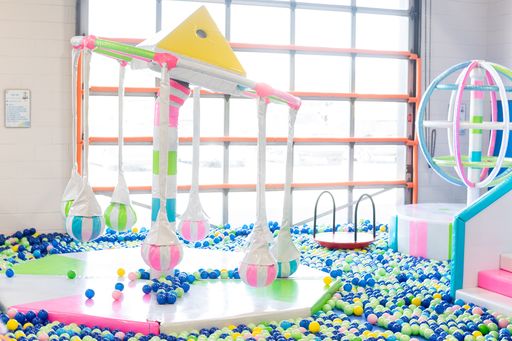
To design a facility with this kind of freedom, Candace had to first consider barriers.
“Inclusion is pretty easy to master,” Candace says, “As long as you have individuals with disabilities in mind first.”
So that’s precisely what Candace did, by purposefully considering every aspect of Q’s Corner from the perspective of a person with disabilities.
“I personally put myself in limiting situations and that’s how I picked the equipment,” Candace explains. “I had to take away my hands, take away my feet, and take away my vision. I taught myself to put myself in someone else’s shoes.”
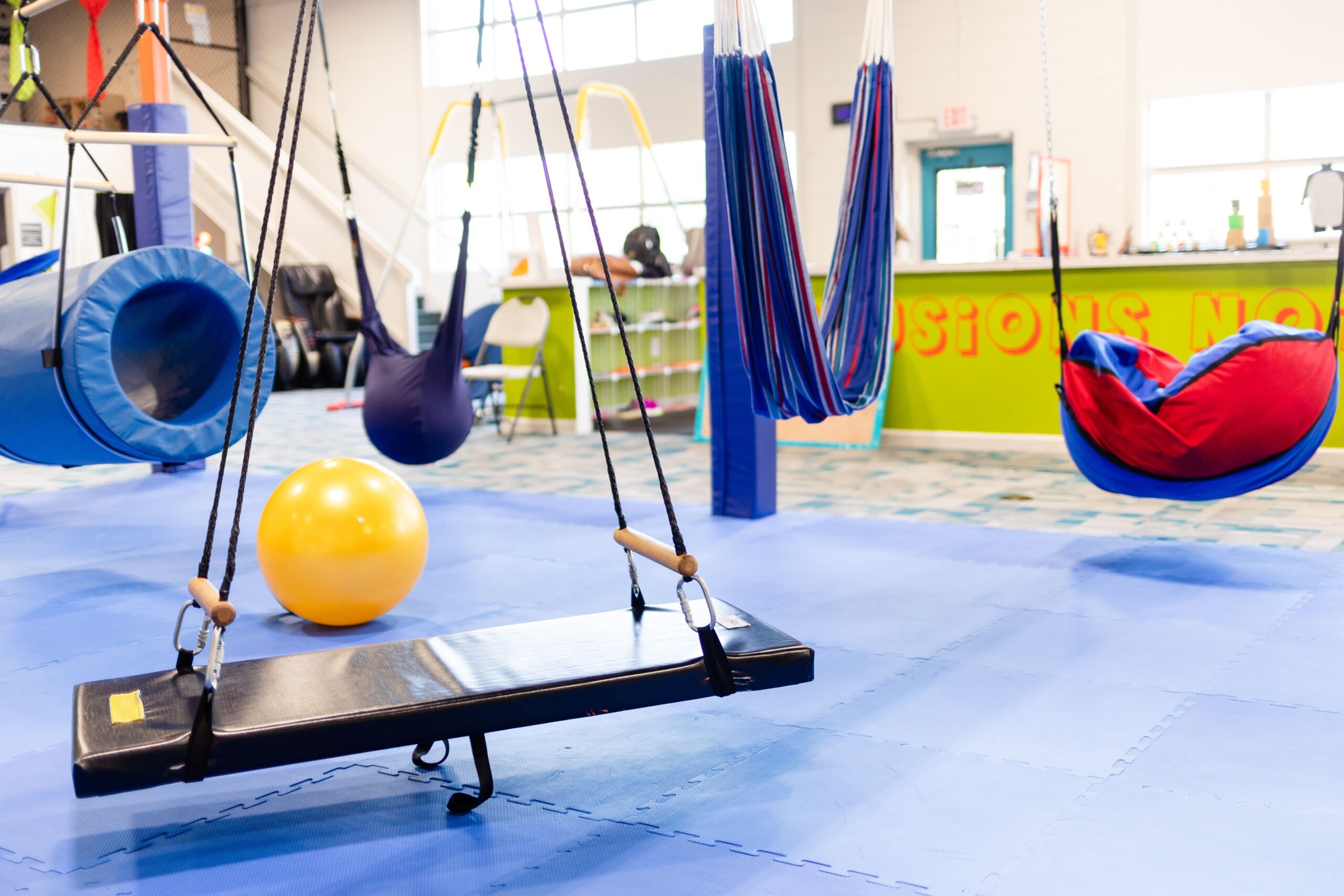
Q’s Corner offers a wide variety of swings in their main gym for a variety of abilities.
But Candace is quick to add that inclusion and accessibility extend beyond the question of if a building has wheelchair access. Beyond physical barriers, Candace observed how few activities most facilities offered for kids with disabilities.
“We recently had a girl who celebrated her 16th birthday here. She was non-verbal and she also had some issues walking,” Candace says. “For the first time, she was able to participate in everything versus going to a party and just sitting around with nothing to do.”
With the motivator of making the space both physically, mentally, and socially accessible, Candace crafted Q’s Corner with a myriad of intentionally designed activities, from their various swings, trampolines, ball pit, and sensory walls. One room, the Experience Room, is devoted to giving participants a 360-degree, VR experience with tablet-controlled graphics and scenescapes the participant can control (one of just a few rooms like this in the nation!). The Sensory Room, designed as a quiet space with soft lights gives space to explore in a calmer environment. And the Soft Play Room is complete with wall-to-wall padding, perfect for individuals with visual or physical impairments, as well as toddlers who are learning spatial awareness.
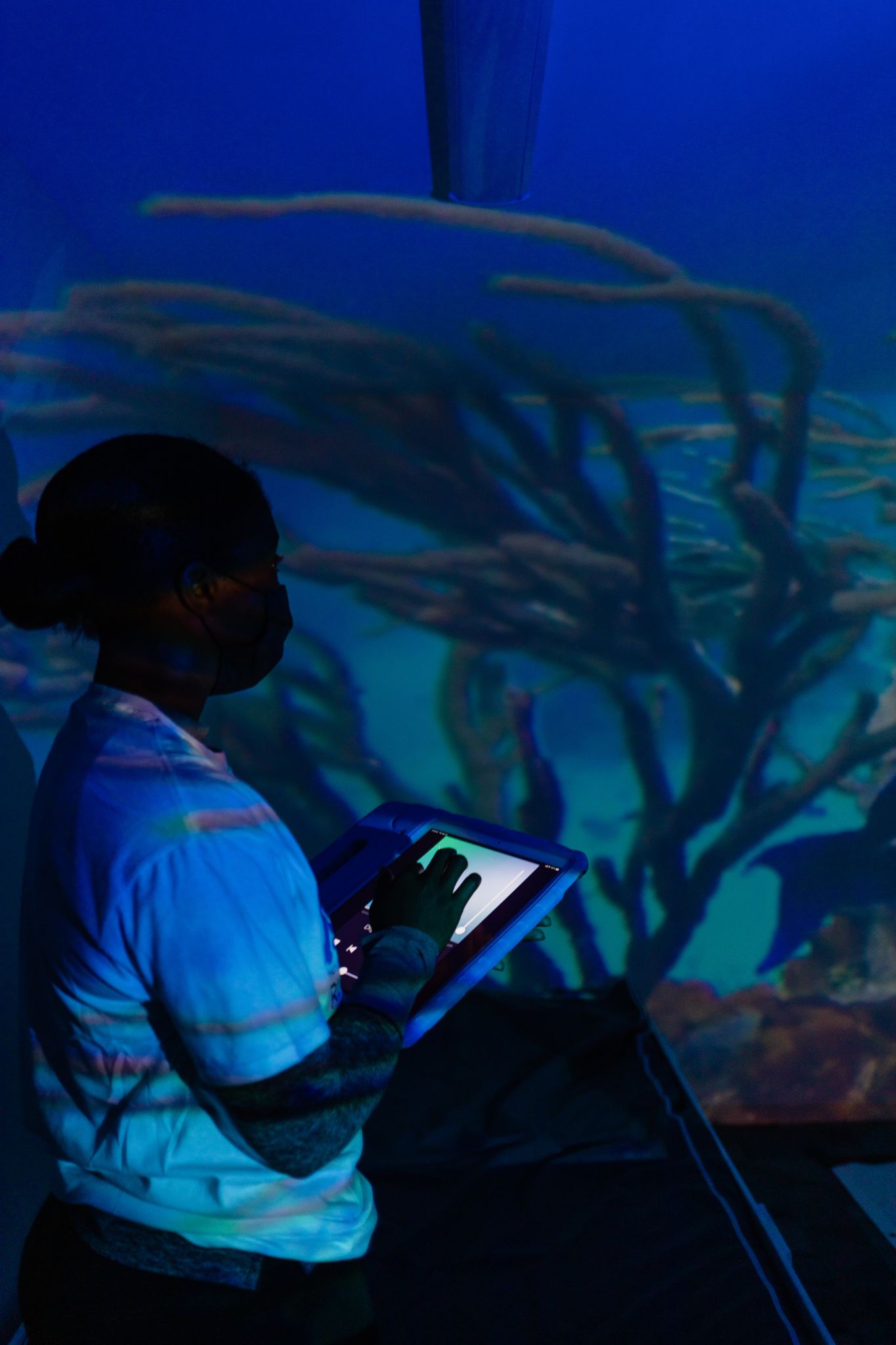
The Experience Room allows participants to enjoy a 360-degree VR experience.
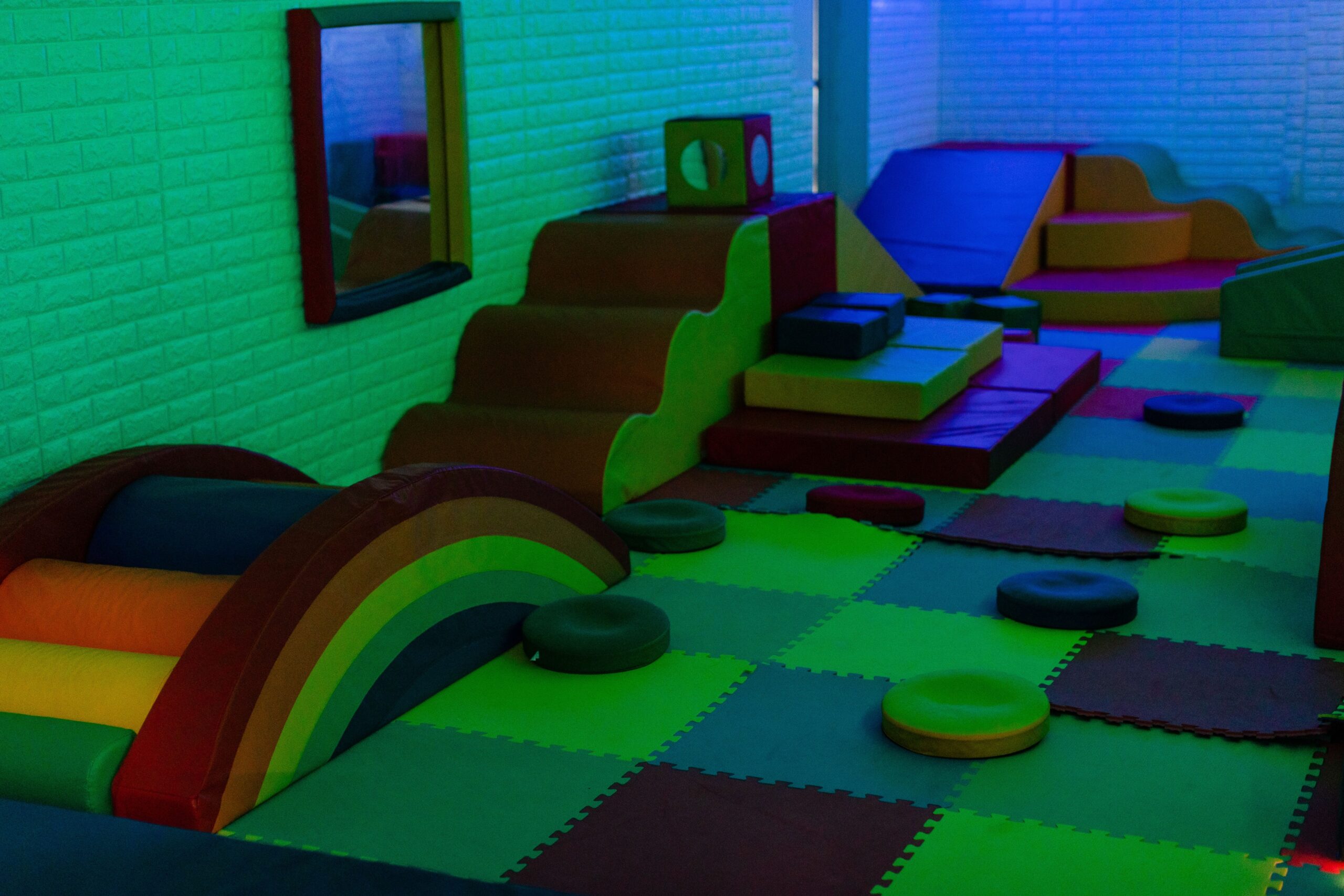
The Soft Play Room at Q’s Corner offers 360-degree padding.
Q’s Corner is also working hard to make good on their motto, “Inclusions not an Illusion.”
She notes that before her son was diagnosed with autism, she rarely considered what it meant for a space to be “inclusive” of individuals with disabilities. Now, she wants all parents and people to see the tremendous value in introducing their children to diversity and inclusivity.
“Getting that exposure at an early age is really important,” Candace says. “It helps neurotypical kids to be more aware, more cautious, and more well-rounded.”
When she considers her first interactions with disabilities as a child, Candace is disappointed in the lack of support and awareness from some of the teachers and adults in her life. She recalls a classmate from elementary school who used a wheelchair. The teachers cautioned students to stay out of her way, which often resulted in others ignoring their classmate. While perhaps once well-intentioned advice, the behavior caused harm.
“I remember from a young age being curious about her, but being scared to ask or being scared to speak to her,” Candace says, noting that she was never taught that this peer could talk, engage, play, and enjoy friendships just like the other children in her class.
“If I had only known as a kid that just because I see something that’s limiting, doesn’t mean that is the complete end,” Candace reflects. “So that’s what we want to teach kids. We want to teach them that it’s okay to start a conversation with someone who looks different from you or who doesn’t have legs like yours.”
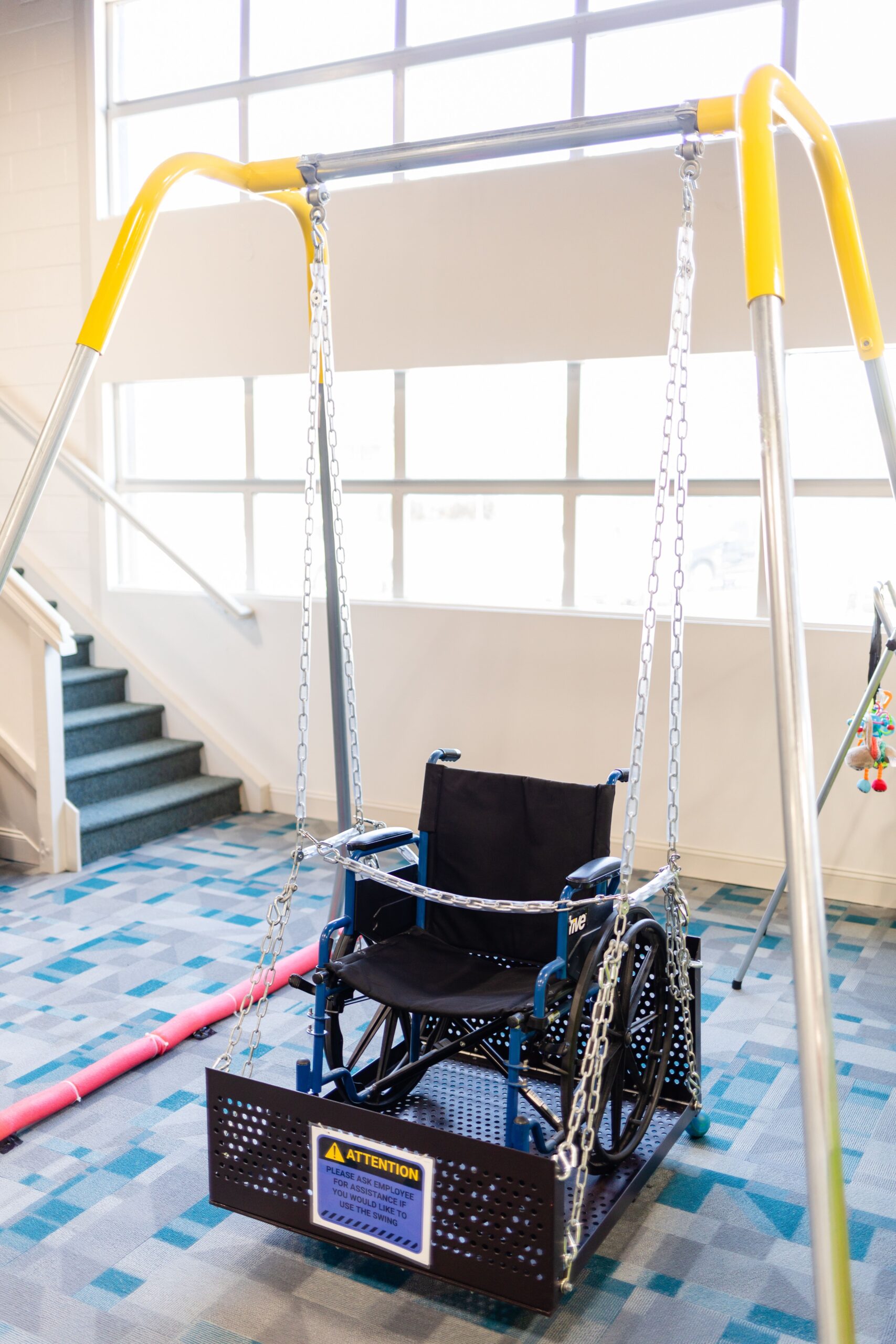
She adds how important it is for parents who have children of all abilities to start having conversations with their kids like this. She encourages them to let their kids ask questions, to encourage empathy, and to open their minds to understanding not everyone plays, looks, or talks like them.
“Because now we can get into the realm of explaining, ‘Well, that child has autism. He doesn’t communicate the way that you communicate, but he’s still likes and enjoys your company,’” she says. “Those conversations show them that just because someone is different, doesn’t mean that they can’t participate. They just may need to participate in a different way.”
That’s why ultimately, Q’s Corner is a place for all individuals to be included, not just individuals with disabilities. It’s a place to foster growth and joy for many kids who can’t participate in other settings. It’s a place where all can come and learn to engage with their neighbors. And those who have experienced Q’s Corner can already attest that it is accomplishing its purpose.
“One mom recorded her daughter running around, and the mother just asked the question, ‘Are you having fun?’ And the little girl said, ‘I am!’” Candace says. The mother was overjoyed because her daughter has been non-verbal for years.
“I always say Q’s Corner is a place of healing,” Candace adds. “Not just a play gym, but a place where kids come and get healing.” She says with years of prayer and faith in God to bring about miraculous changes in her son, Candace is confident that no parent should ever settle for the diagnosis they are given.
“At any given time, a miracle can happen,” she concludes. “And that’s what happened with my son. They said he wouldn’t talk, and now he’s reading and becoming more and more functional every day.”
Eventually, Candace and her team at Q’s Corner hope to bring even more awareness to accessibility and inclusion in the High Point community, through business training seminars, resources like their sensory bags, and community events to continue fostering an inclusive community for the city.
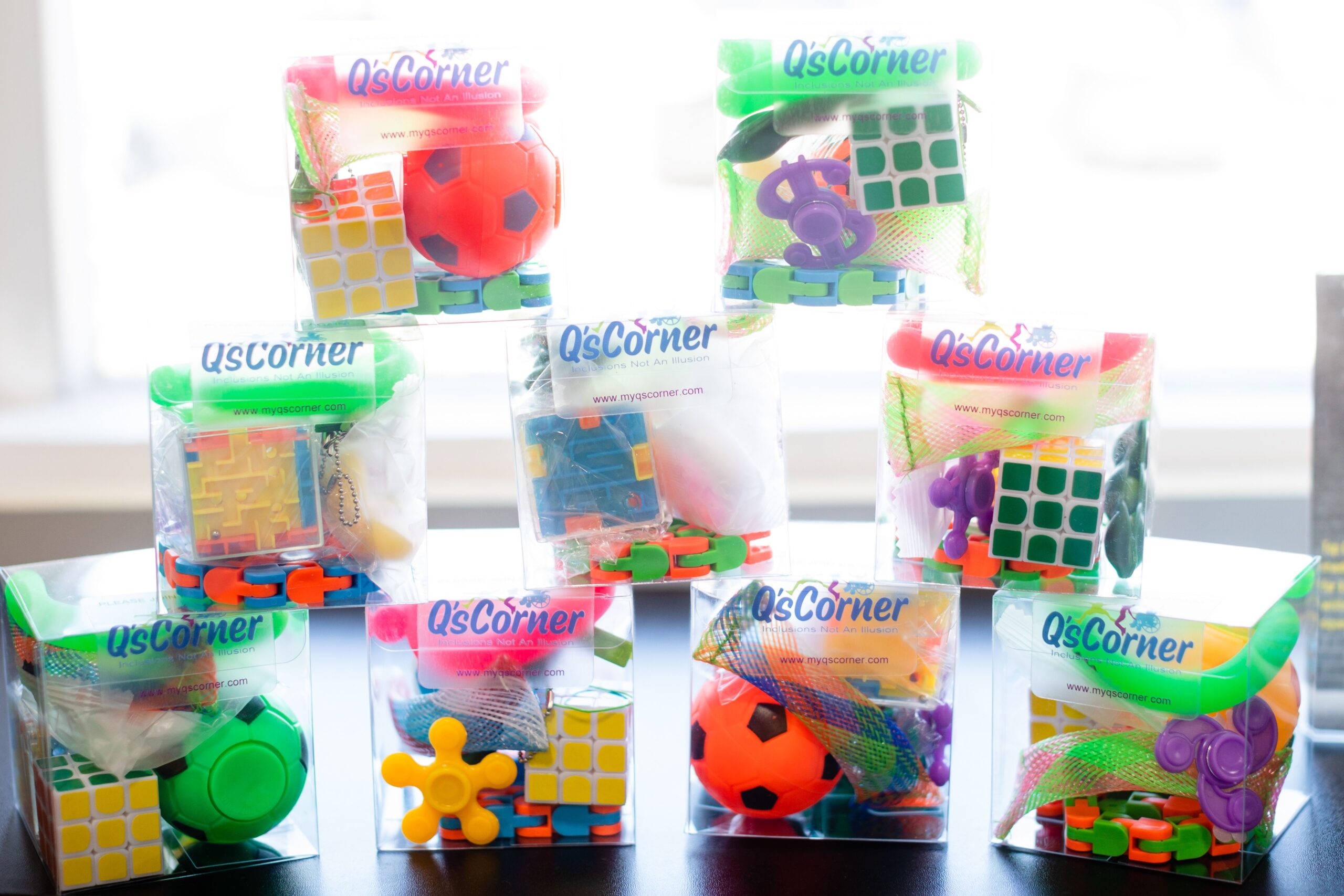
Q’s Corner offers games and “sensory bags” to their customers to have in social situations that may not have activities for those with disabilities.
Because while Candace would have found a way to bring Q’s Corner to life anywhere, she and her husband had a special reason for bringing this one-of-a-kind facility to High Point.
“My husband and I are both from High Point,” says Candace. Her husband, a graduate of Andrews High School, spent 11 years traveling and playing in the NFL. Candace and William were actually living in California when Candace was first inspired by the vision of Q’s Corner.
“This business would do well in California, and there’s a huge market for it there,” Candace says. “We kind of went back and forth… but we decided we wanted to bring something to our community first as a commitment to our city.”
While Candace ultimately plans to franchise Q’s Corner, her first priority lies with the city she calls home.
“The way to give back is to bring this light and attention to High Point first.”
Get started at Q’s Corner by reserving your playtime spot today!
Discover our High Points,
The HPD Team
Photography by Red Cardinal Studio
